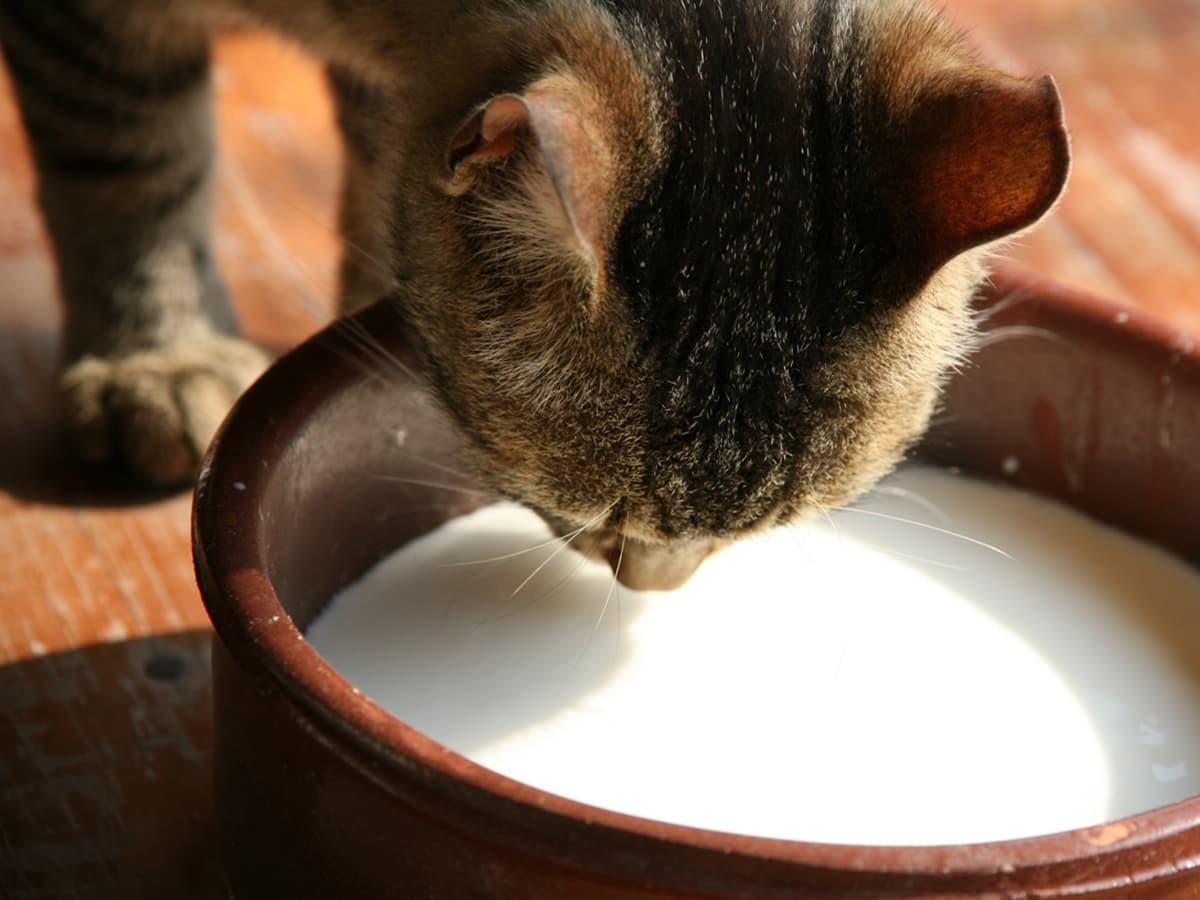There was a time when almost all cat lovers used to take out milk from their refrigerators and put it in a bowl for a cat who seemed hungry. Even today you’ll see most people doing this. Then people learned that milk is actually not the best thing to feed cats and may cause digestive upset in them. After this, people started looking for lactose-free options for cats. Since then, this question has been raised: Can cats drink almond milk?
We humans (especially the vegans) have been deriving lots of benefits from almond milk. It is rich in vitamins and minerals with Vitamin E being the highest. Nowadays, you also get enriched almond milk in the market, loaded with all the missing elements like calcium, vitamin D, protein, etc. Consuming nuts daily also helps reduce the risk of heart disease. Looking at all this, it is natural for people to think that almond milk may be healthy for cats too. (2)
But when it comes to feeding almond milk to cats, it does more harm than good. It is not toxic to cats but does not provide any nutritional benefit as such. Cats can drink almond milk in moderation and occasionally. But the more important question here is -
Is Almond Milk Good for Cats?
Not really. Here’s why – (1)
Not protein-rich – Cats need a protein-rich diet to remain healthy and energetic. This is why the majority of a cat’s diet should be meat-based. The small amount of plant protein in almond milk will be inadequate for cats. the fat-to-protein ratio here is also inadequate.
Fatty – Almond milk may be considered low fats for humans but it contains around 3 grams of fat per cup, which is high for a cat.
Calorie-dense – One cup of almond milk contains around 30-60 calories. An indoor cat should have 20 calories per pound each day to remain healthy. If you feed almond milk on top of your cat’s regular diet which already matches the required calorie count, you stand a chance of making your cat obese. Elderly cats and breeds like the Maine Coon and Ragdoll already have a propensity to get obese.
Digestive issues – Over consumption of almond milk can cause gastrointestinal problems in cats. Even a healthy cat can experience abdominal pain, flatulence, or vomiting from it. Cats who suffer from chronic conditions like IBD (inflammatory bowel disease) are more at risk of digestive upset from almond milk.
Preservatives – Few people will make almond milk at home. Most will resort to store-bought options. Most of them contain artificial sweeteners and preservatives. These can cause harm to your cat.
Can I Give My Cat Almond Milk with Sweetener?
It is best if you avoid any type of sweetener in almond milk if you’re feeding it to your cat. Flavored almond milk usually contains artificial sweeteners and flavorings. These can cause a digestive upset for your cat. They can even cause weight gain and tooth decay.
Can Cats Drink Oat Milk?
Yes, cats can drink oat milk in moderation and occasionally. But should they? The answer is no. There aren’t any real benefits of any kind of milk for cats. It may sound like a good option for lactose-intolerant cats but it’s not. There are chances of your cat getting an upset stomach later, especially if it is sweetened oat milk. (3)
What about other types of milk?
Let’s see – (1)
Coconut milk – You’ll see cat enthusiasts advising coconut oil as a solution for joint pains and other inflammatory problems in a cat’s body. But, when it comes to coconut milk, the high amount of saturated fats can cause immediate gastrointestinal problems, including vomiting and diarrhea.
Soya milk – If almond milk is considered calorie-dense, soya milk is calorie-dense max. It contains 80-100 calories per cup along with stachyose and raffinose, two types of complex carbohydrates that cats can’t digest. Too much soya milk can even cause teeth erosion and eventual loss.
Rice milk – The problem with rice is its high carb content. With around 20 grams of it per cup, this starchy cereal may not be the best option for your cat even in a milk form.
In summary, cats and milk is a bad combination, irrespective of where the milk came from.
More About Spot Pet Insurance
Having a cat in the house is a beautiful experience. But there will be times when your feline ends up feasting on things they are not supposed to or you unknowingly feed them foods that can cause a digestive upset and other problems for them. Some cases may get serious, and your cat may even need surgery. For those times and for all others when you have to take your cat to the vet, you can save up to 90% of the costs with pet health insurance.
With a Spot accident and illness plan, you can take your cat for treatment at any licensed vet in Canada or the U.S. Spot plans don’t have networks, so whether you’re home or traveling within the U.S, veterinary services your cat receives for the diagnosis, treatment, or management of eligible services can be covered. Spot’s accident and illness plans can help cover a variety of conditions, ranging from broken bones and bite wounds to behavioral conditions, and cancer. While base plans do not offer coverage for preventive care services, Spot’s Wellness Riders can be added to any base plan for an additional fee and can help cover the eligible costs of wellness exams, vaccinations, dental cleanings, and more!
Learn more about cat insurance or get a free quote!

I've had the privilege of immersing myself in the realm of pet safety. As the owner of an energetic mini golden doodle, I know just how stressful being a pet owner can be. I am dedicated to ensuring our beloved pets enjoy a life brimming with good health.
*Jan 2019 to Aug 2024 Spot Pet Insurance Services, LLC claims data.
Adams, Christian. "Can Cats Drink Almond Milk?" Catster, 19 Jun. 2025, https://www.catster.com/nutrition/can-cats-drink-almond-milk/.
Willoby, Shannon. "10 Fat Cat Breeds That Can Easily Become Overweight." PetMD, 04 Oct. 2024, https://www.petmd.com/cat/general-health/top-fat-cats.
Gruber, Ben. "Lactose Intolerance in Cats..." Animal Biome, 17 Oct. 2024, https://www.animalbiome.com/blogs/cat/lactose-intolerance-in-cats-is-milk-good-for-my-cat.
The information presented in this article is for educational and informational purposes only and does not constitute or substitute for the advice of your veterinarian.












